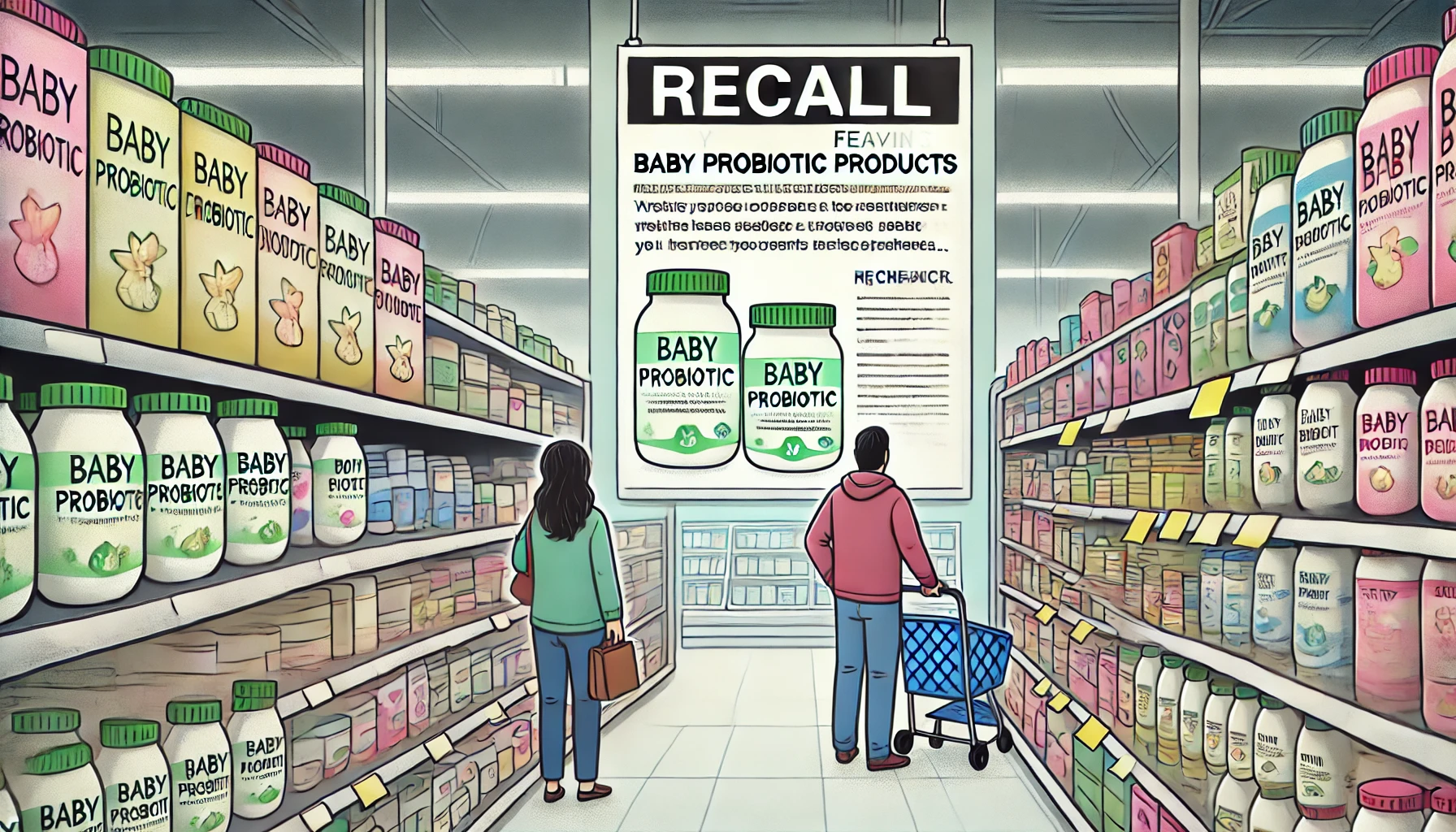The MaryRuth Organics Recall has drawn significant attention from parents and health-conscious consumers. This recall was initiated as a precautionary measure to address potential contamination in specific batches of their infant probiotic products.
MaryRuth Organics, known for its commitment to natural and high-quality supplements, acted swiftly to ensure consumer safety. The recall highlights the company’s dedication to transparency and customer well-being.
The MaryRuth Organics Recall involves concerns over possible contamination with Pseudomonas aeruginosa, a bacterium that poses health risks, especially to infants and individuals with compromised immune systems.
MaryRuth Organics Recall: What Parents Need to Know
The MaryRuth Organics Recall was initiated due to concerns about potential contamination in certain liquid probiotics for infants. This recall underscores the importance of parents staying informed about the products they use for their children.
MaryRuth Organics identified specific lots of its infant probiotics that may have been exposed to Pseudomonas aeruginosa, a harmful bacterium. While the risk is relatively low for healthy infants, the recall is a proactive measure to prevent potential health issues.
Parents are advised to immediately stop using the affected products and check the lot numbers listed on the company’s recall notice. If the product matches the recall list, it should be returned or discarded.
Table: Actions for Parents During a Product Recall
| Step | Action |
| Stop Usage | Discontinue use of the affected product. |
| Check Lot Numbers | Verify the lot number against the recall list. |
| Contact Retailer or Brand | Request a refund or replacement. |
MaryRuth Organics has provided clear instructions for handling the recalled products. Additionally, they emphasize reaching out to healthcare professionals if parents notice any unusual symptoms in their infants.
Potential Contamination in Infant Probiotic Products
The contamination concerns in infant probiotic products are linked to the presence of Pseudomonas aeruginosa. This bacterium can cause infections, particularly in vulnerable populations such as infants with weakened immune systems.
Probiotics are generally marketed as beneficial for gut health, but contamination risks highlight the need for stringent quality control measures. In this case, contamination likely occurred during the manufacturing or packaging process.
It’s critical to understand that contamination incidents like this are rare. Companies, including MaryRuth Organics, often take proactive steps to maintain the safety and trust of their consumers.
Bullet Points on Contamination Concerns:
- Pseudomonas aeruginosa is an opportunistic pathogen.
- Infants with underdeveloped immune systems are more susceptible to harm.
- Proper handling and quality assurance reduces contamination risks.
Consumers should ensure they are purchasing products from reputable brands that adhere to safety guidelines.
MaryRuth Organics Recall: Key Details on Affected Lots
The MaryRuth Organics Recall applies to specific lots of their liquid infant probiotics. The affected products were sold in multiple retail locations and online platforms.
Lot numbers of concern are listed on the recall notice published on the company’s website. Parents should check these lot numbers on their product bottles to determine if their purchase is part of the recall.
Products involved in the recall are primarily designed for infants, and no other MaryRuth Organics products have been affected at this time. Consumers are encouraged to regularly monitor updates from the company.
MaryRuth Organics has offered a refund or exchange for any affected products. This proactive approach demonstrates their commitment to resolving the issue.
Understanding Pseudomonas aeruginosa in Infant Supplements
Pseudomonas aeruginosa is a bacterium that occurs naturally in soil and water. While harmless to most healthy individuals, it can be dangerous to infants and immunocompromised individuals.
This bacterium is known for its resistance to many antibiotics, making infections harder to treat. Symptoms of infection include fever, fatigue, and localized redness or swelling.
Infants consuming contaminated supplements may be at risk of developing gastrointestinal or systemic infections. Parents should monitor their children for signs of infection and seek medical advice if symptoms appear.
To prevent contamination, supplement manufacturers implement rigorous sterilization and testing procedures. MaryRuth Organics has promised to enhance its quality control processes following the recall.
Steps Taken by MaryRuth Organics After the Recall
Following the recall, MaryRuth Organics has implemented several measures to prevent similar incidents in the future. These include reviewing their manufacturing processes and collaborating with regulatory authorities.
The company issued public notices to inform customers about the recall and provide guidance on returning or discarding affected products. Their transparency in communication has been widely appreciated.
MaryRuth Organics is also working closely with third-party auditors to assess their safety protocols. The goal is to identify any gaps and ensure compliance with industry standards.
Additionally, the company has pledged to invest in advanced technology to improve product testing and reduce contamination risks. These steps demonstrate a strong commitment to customer trust and product safety.
By addressing this issue openly, MaryRuth Organics aims to maintain its reputation and continue serving families with high-quality, reliable supplements.
Consumer Safety Amid Reports of Contamination
Consumer safety remains a top priority amid the reports of contamination tied to the MaryRuth Organics recall. Parents are particularly vigilant when it comes to infant health, making transparency and swift action crucial.
MaryRuth Organics identified the contamination risk and took immediate steps to issue a recall. This proactive approach minimizes the potential for harm and reassures customers of the company’s dedication to safety.
To mitigate risks, consumers should inspect all product packaging for batch and lot numbers, ensuring that they are not using products included in the recall. Following proper disposal or returning affected products is essential.
Chart: Key Steps for Ensuring Consumer Safety
| Step | Action Required |
| Inspect Product Packaging | Verify batch and lot numbers. |
| Discontinue Use | Stop using affected products immediately. |
| Follow Recall Guidelines | Contact manufacturer for returns or refunds. |
Education on contamination risks and adherence to company-provided recall instructions ensures that safety concerns are effectively addressed.
How the MaryRuth Organics Recall Impacts Infant Health
The MaryRuth Organics recall raised questions about the potential impact on infant health. Contaminated products may expose infants to harmful bacteria, posing risks to their underdeveloped immune systems.
Pseudomonas aeruginosa, the bacterium identified in this case, can lead to infections, especially in vulnerable infants. Symptoms such as fever, irritability, or changes in feeding habits may indicate a problem.
Parents should consult pediatricians if their child shows any concerning signs after using a recalled product. Early intervention is critical in managing potential infections.
Fortunately, no widespread health issues have been reported following the recall. MaryRuth Organics’ swift action limited the exposure of contaminated products, significantly reducing potential risks.
The incident underscores the importance of strict quality controls in the manufacturing of products for infants, ensuring both safety and consumer confidence.
Guidelines for Checking and Returning Affected Products
Parents and consumers need clear guidelines for checking and returning products impacted by the recall. This ensures proper disposal and reduces risks associated with using contaminated items.
The first step is to verify the product’s lot number, which can be found on the packaging. Consumers should compare this with the lot numbers listed in the official recall notice issued by MaryRuth Organics.
If the product matches the recalled lot, it should be discontinued immediately. Consumers can either return it to the place of purchase or contact MaryRuth Organics directly for a refund or replacement.
Bullet Points for Quick Reference:
- Locate the lot number on the product label.
- Cross-check the lot number with the recall notice.
- Discontinue use if the lot matches the recall list.
- Contact MaryRuth Organics or retailer for instructions on returns.
Proper handling and adherence to recall procedures ensure consumer safety and streamline the recall process.
Regulatory Responses to Supplement Recalls
Supplement recalls, such as the MaryRuth Organics incident, often prompt regulatory scrutiny. Agencies like the FDA oversee these cases to ensure public safety and compliance with manufacturing standards.
In this recall, regulatory bodies reviewed the contamination reports and monitored the company’s actions. Transparency in handling such incidents is critical for maintaining consumer trust.
Regulatory agencies often mandate enhanced safety measures and audits for companies involved in recalls. This ensures that manufacturing processes align with strict safety guidelines.
The MaryRuth Organics recall serves as a case study for improving regulatory frameworks around supplement production. Collaboration between manufacturers and agencies is vital in preventing future contamination events.
Clear communication from regulatory bodies and companies ensures that affected consumers are informed and reassured of the steps being taken to protect public health.
MaryRuth Organics Recall: Ensuring Product Safety in the Future
MaryRuth Organics is taking significant steps to ensure product safety following the recall. These measures are designed to prevent future contamination and restore consumer confidence.
The company has implemented advanced testing methods to detect contaminants during manufacturing. These methods include improved sterilization and quality control checks at every production stage.
Increased collaboration with third-party auditors is another step the company is taking. Auditors evaluate manufacturing processes, providing recommendations to close safety gaps.
MaryRuth Organics is also focusing on employee training. Workers involved in production and packaging are receiving updated training on contamination prevention and safety standards.
Table: Key Safety Enhancements Post-Recall
| Action | Purpose |
| Advanced Testing Protocols | Early detection of contaminants. |
| Third-Party Audits | Independent review of safety measures. |
| Enhanced Employee Training | Ensure adherence to updated safety practices. |
These steps showcase the company’s commitment to maintaining product safety and delivering high-quality supplements.
Tips for Parents Navigating Supplement Recalls
When a supplement recall occurs, parents must take quick and informed actions to protect their children’s health. Here are essential tips to navigate such situations effectively.
Verify the Recall Information: Cross-check the product’s lot number with the official recall notice. This helps identify if the product is part of the recall.
Stop Using the Product Immediately: Discontinue use of the supplement until its safety is confirmed.
Contact the Manufacturer or Retailer: Request instructions on returning or discarding the product. Many companies offer refunds or replacements.
Consult a Pediatrician: If your child has consumed the recalled product, seek medical advice, especially if they exhibit unusual symptoms.
Stay Informed: Monitor updates from the company and regulatory agencies to stay aware of new developments.
By following these steps, parents can safeguard their children’s health during a recall situation.
Learning from the MaryRuth Organics Recall Incident
The MaryRuth Organics recall provides valuable lessons for both companies and consumers. It highlights the importance of robust safety protocols and transparent communication.
For companies, the recall emphasized the need for proactive contamination detection and stricter quality assurance measures. Swift action and clear consumer guidance can mitigate risks and preserve brand reputation.
Consumers learned the importance of staying informed about product recalls. Understanding how to identify affected products and respond effectively minimizes potential harm.
This incident also demonstrated the value of transparency. MaryRuth Organics’ open communication reassured customers of their commitment to addressing the issue.
The industry can use this event as a case study to develop better guidelines for manufacturing and recalling supplements, ultimately enhancing overall safety standards.
Industry Standards and Lessons from Recent Recalls
The MaryRuth Organics recall is one of several incidents that have prompted discussions about supplement safety. Recalls expose weaknesses in production and distribution processes, encouraging the adoption of stricter industry standards.
Recent recalls have led to advancements in manufacturing technology, such as automated systems for contamination detection. These technologies reduce the chances of human error and improve efficiency.
Lessons from recalls also emphasize the importance of traceability. Detailed records of production batches enable companies to quickly identify and isolate affected products during a recall.
Bullet Points: Key Takeaways for the Industry
- Embrace advanced contamination detection technologies.
- Strengthen traceability systems for faster recalls.
- Increase collaboration with regulatory bodies for compliance.
- Enhance consumer communication to build trust.
By addressing these areas, the supplement industry can improve its standards and reduce the frequency of recalls, ultimately ensuring safer products for consumers.
Last Word
The MaryRuth Organics Recall serves as an important reminder of the significance of quality control and transparency in the supplement industry. By addressing the contamination risk promptly, MaryRuth Organics demonstrated its commitment to consumer safety and trust.
This incident also highlights the importance of vigilance among consumers. Staying informed about recalls and following recommended guidelines can mitigate potential risks and protect families from harm.
As the company implements enhanced safety measures and stricter quality protocols, the recall becomes a learning opportunity for both the brand and the industry. It underscores the shared responsibility of manufacturers, regulators, and consumers in ensuring the safety of health-related products.
Recommended Articles:
Florida Mesothelioma Lawyer Vimeo: Simplifying the Legal Process for Mesothelioma Victims
Matthew Eisert Physician Assistant: Leveraging Teamwork to Drive Excellence in Healthcare Delivery




